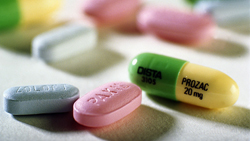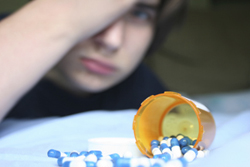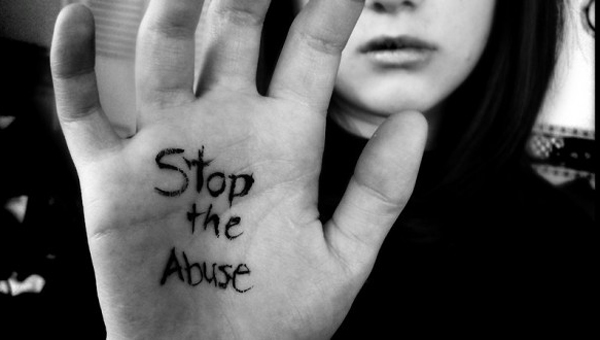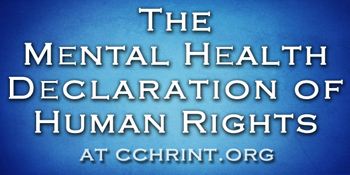Group Charges that the Psychiatric-Pharmaceutical Funded Mental Health “Awareness” Week Ignores Dangers of Psychiatric Drugs and Other Treatments
By Kelly Patricia O’Meara
September 28, 2015
Citizens Commission on Human Rights International (CCHR), a 46-year mental health watchdog warns that the upcoming Mental Health Awareness Week (Oct. 4-10) and World Mental Health Day (Oct. 10), ignores that millions of children’s childhood behavior has been misleadingly redefined as “disease,” stigmatized and drugged for profit and that tens of thousands of our elderly are drugged and electroshocked, damaging their fragile minds and bodies.
The drug “treatments” are so potentially harmful that the United Nations Special Rapporteur on Torture, Mr. Juan Méndez, recommended an “absolute ban on all forced and non-consensual” administration of “electroshock and mind-altering drugs.”[1]
Because such information is often ignored during Mental Health Awareness Week CCHR has launched its updated 1969 Mental Health Declaration of Human Rights, which defines rights, when legally implemented, could save lives and prevent harm. The Declaration insists upon inalienable rights that include no person being forced to undergo psychiatric treatment or denied personal liberty by reason of so-called mental illness. It also reinforces the need to be fully informed about the lack of medical science in psychiatric disorders (no physical test can confirm them) and the adverse effects of psychotropic drugs and other psychiatric “treatments.”
The safeguards in CCHR’s Declaration are needed now more than ever, charging that Mental Health Awareness Week serves an industry that primarily advocates physically damaging practices that reap huge profits. The conflicts of interests are not disclosed.
Facts:
- Mental Health Awareness Week (MHAW) began in 1990, instigated by a pharmaceutical company-funded mental health group that The New York Times in 2009 exposed had been given direct drug company advice about how to advocate forcefully for issues that affect industry profits. [2]
-

By 1998, more than 60 million prescriptions for antidepressants had been written for the American population, including half a million children.
In 1990, psychiatrist Douglas Jacobs also devised national Depression Screening Day, which is held during MHAW, funded by a grant from Eli Lilly, the manufacturer of the antidepressant, Prozac.[3] The drug was marketed as treating a “chemical imbalance in the brain” causing “depression”—later exposed as false and invented to market SSRI antidepressants. In 1990, Prozac was the country’s most prescribed antidepressant, topping $1 billion in sales.[4] By 1998, more than 60 million prescriptions for antidepressants had been written for the American population, including half a million children. [5]
- In 2003, the “branded” depression drug market was worth nearly $15 billion.[6] And by 2014, more than 30 million Americans were taking antidepressants—11% of Americans over age 12. [7]
- More than 270 million antidepressant prescriptions are now written per year,[8] including to 2.2 million children and adolescents.[9]
- This year researchers found 15 to 24 year olds taking antidepressants were about 43% more likely to be convicted of a serious crime such as homicide, assault, arson, robbery, kidnapping, and sexual offense when taking the antidepressant than when they weren’t.[10] IMS reports that more than 4 million teens and young adults in the U.S. take antidepressants.[11] That’s a potential 1.7 million violent crimes that could occur. [12]
- At least 35 school shootings and/or school associated acts of violence with 169 wounded and 79 killed have already been committed by students and others taking or withdrawing from psychiatric drugs.
- This year, researchers also debunked Study 329 that in 2001 claimed the antidepressant Paxil was safe for children, covering up suicide risk. An analysis of the study’s original patient records published in the British Medical Journal in September found suicide attempts were significantly higher than what the study reported and there were many other unreported serious adverse events. Two million youngsters were prescribed Paxil within a year of the study’s publication, with the potential to drive them to suicide.[13]
-

More than 8 million American children and 20 million children worldwide are now prescribed mind-altering drugs.
Add to that, more than 8 million American children and 20 million worldwide are now prescribed mind-altering drugs.
- And nearly 30% of seniors in nursing homes and nearly 14% living outside of nursing home care are given antipsychotics to treat the behavioral symptoms of dementia—despite specific warnings that they not be given to such patients due to an increased risk of falls or death.[14]
With all this, CCHR’s Declaration needs implementing by law in all sectors of the mental health system, providing each person with the right to:
- Have a thorough, physical examination by a competent doctor of one’s choice, to ensure that one’s mental state is not caused by any undetected and untreated physical illness, injury or defect.
- Be fully informed, including all alternatives.
- Choose or reject any recommended psychiatric treatment.
- Seek criminal action against any mental health practitioner for abuse, torturous, cruel, inhuman or degrading treatment, false imprisonment, assault, rape, or any violation of mental health or other law.
- Sue for damages incurred in the mental health system.
Kelly Patricia O’Meara is an award-winning former investigative reporter for the Washington Times’ Insight Magazine, penning dozens of articles exposing the fraud of psychiatric diagnosis and the dangers of the psychiatric drugs—including her ground-breaking 1999 cover story, “Guns & Doses,” exposing the link between psychiatric drugs and acts of senseless violence. She is also the author of the highly acclaimed book, Psyched Out: How Psychiatry Sells Mental Illness and Pushes Pills that Kill. Prior to working as an investigative journalist, O’Meara spent sixteen years on Capitol Hill as a congressional staffer to four Members of Congress. She holds a B.S. in Political Science from the University of Maryland.
References:
[1] “Report of the Special Rapporteur on torture and other cruel, inhuman or degrading treatment or punishment, Juan E. Méndez,” UN Human Rights Council, 1 Feb.2013, http://www.ohchr.org/Documents/HRBodies/HRCouncil/RegularSession/Session22/A.HRC.22.53_English.pdf.
[2] “Drug Makers Are Advocacy Group’s Biggest Donors,” The New York Times, 22 Oct. 2009, http://www.nytimes.com/2009/10/22/health/22nami.html?_r=0; “About Mental Health Awareness Week, 2015,” http://mhaweek.org/
[3] https://mentalhealthscreening.org/about
[4] http://content.time.com/time/health/article/0,8599,1952143,00.html
[5] Joseph Glenmullen, M.D., Prozac Backlash, (Simon & Schuster, NY, 2000), p. 15
[6] http://sciencewatch.com/sites/sw/files/sw-article/media/sw-depression-infographic.pdf
[7] http://www.sfgate.com/health/article/Antidepressants-nation-s-top-prescription-4034392.php
[8] http://blog.timesunion.com/holistichealth/antidepressants-widely-used-but-practically-useless/14468/
[9] http://www.cchrint.org/psychiatric-drugs/antidepressantsideeffects/people-taking-antidepressants/
[10] http://www.reuters.com/article/2015/09/15/us-health-antidepressants-crime-idUSKCN0RF2BB20150915
[11] http://www.cchrint.org/psychiatric-drugs/antidepressantsideeffects/people-taking-antidepressants/
[12] Yasmina Molero, Paul Lichtenstein, Johan Zetterqvist, Clara Hellner Gumpert, Seena Fazel, “Selective Serotonin Reuptake Inhibitors and Violent Crime: A Cohort Study,” PLoS Medicine, 15 Sept. 2015, DOI: 10.1371/journal.pmed.1001875 http://journals.plos.org/plosmedicine/article?id=10.1371/journal.pmed.1001875
[13] “Global drug giant GSK ‘published a flawed study which led to millions of children being wrongly prescribed dangerous antidepressants’,” The Daily Mail, 17 Sept. 2015, http://www.dailymail.co.uk/health/article-3238108/Global-drug-giant-GSK-published-flawed-study-led-millions-children-wrongly-prescribed-dangerous-antidepressants.html#ixzz3miCO1fQZ
[14] “One-Third of Seniors with Dementia Are Being Given Antipsychotics,” 21 Apr. 2015, http://www.anh-usa.org/one-third-of-seniors-with-dementia-are-being-given-antipsychotics/




